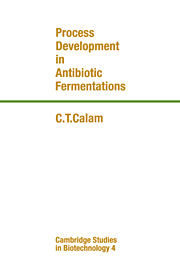Summary
Fermentation process development is a very wide field, and the variety of subjects and tasks involved, very great. One worker may be glad to have achieved 1 gram/litre of a new product, another, with an old one, is stuck at 30 g/l; yet others wrestle with poor or erratic growth, infections, or with economic problems. How can some sort of balance be struck when writing on such a subject? In the present case, an attempt has been made to present a simple account of the subject, illustrated by a few examples. The result is bound to be speculative and over-simplified, and the omission of so many valuable ideas must not be taken as a lack of respect for them. It is only possible to give a few pointers towards problems and to interesting areas of work, which may suggest further analysis of problems and ways to their solution and, hopefully, provide interest to those unfamiliar with the field.
I have to thank the late Professor J. S. Hough for suggesting the writing of the book, and my dear wife for her patience with the resulting decay of home and garden. I am also glad to acknowledge the help of firms and individuals in providing information: Dr J. P. Herman and Glaxo Research, ICI Plc, Agricultural and Pharmaceuticals Divisions, Dr S. W. Carleysmith and Beecham Pharmaceuticals, Dista Ltd, Liverpool, and Dyckerhoff AG, Gulheim, West Germany. I must also thank Dr I. S. Hunter for providing the stylised graph in Fig. 3.9d, and Dr Elizabeth Wellington for reading the drafts and making many helpful suggestions.
- Type
- Chapter
- Information
- Process Development in Antibiotic Fermentations , pp. ix - xPublisher: Cambridge University PressPrint publication year: 1987

